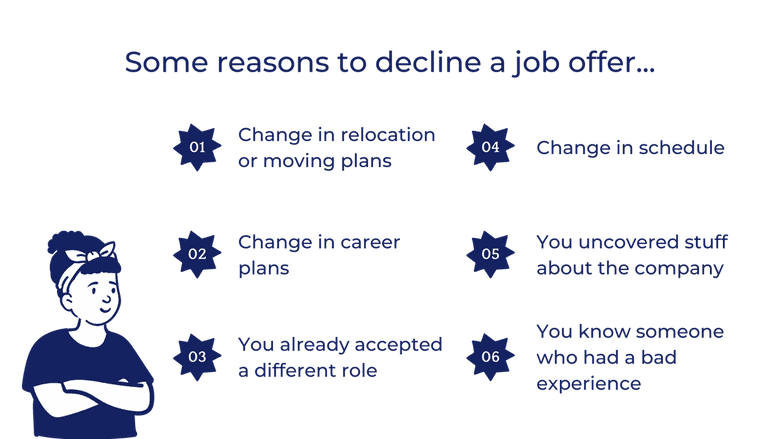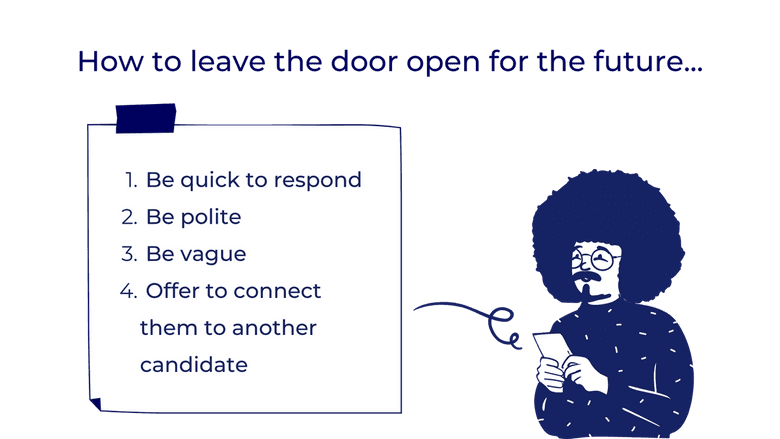Declining a job offer gracefully (templates and talking points)
This is never an easy situation, but there's a way to do it right. Make sure to follow these directions.
Screening applicants is a rigorous process. For Google, Facebook, Apple, and other tech giants, most applicants only receive one interview invite per year—and that’s if you’re a top candidate.
But what if you’re no longer interested in going to the job interview?
It’s an awkward situation. On one hand, you don’t want to seem ungrateful for the interview opportunity, but on the other hand, you don’t want to lead them on only to tell them that you’re not really interested.
Difficult as it seems, the only thing you can do is decline the interview invitation politely. This article will show you how to do just that, complete with email templates you can edit to make this awkward situation easier for you and the recruiter.
6 Common Reasons to Decline a Job Interview

1. Change in relocation or moving plans
Did you have plans to relocate but had to cancel due to unforeseen circumstances? You can tell the recruiter that it would no longer be feasible for you to relocate. Since this is a valid reason with many potential factors behind it, they will understand. If you really want the job, try inquiring if they have an office with open positions near your current residence.
2. Change in career plans
Working as an engineer or developer can be stressful, especially in startups where you’re required to wear multiple hats or big companies with competitive work cultures.
You may have liked the job at first, but further introspection might have made you realize that accepting a similar position would not be the right decision, whether your happiness or something else is at stake.
It’s also possible that you’re serious about your job search, but someone at your current job persuaded you to stay after a quick discussion of your career goals.
There’s no need to tell the recruiter about your career plans, just inform them that you’re grateful for the opportunity but you have other career objectives to pursue.
3. You already accepted a different role before you got the interview invite
For tech giants like Amazon, Uber, or Microsoft, it could take several weeks to hear from a recruiter. You may already have been interviewed by other tech companies or have accepted a job offer. This isn’t a big deal, so recruiters won’t take it against you if it happens.
Inform them that you’ve accepted a new job from another company, but you’re happy they considered your application. The recruiter will just think you’re highly competent because you’ve been hired, and will contact you again for future opportunities.
4. Change in your schedule
You’re excited about the interview, but your availability has changed. Before declining, ask the recruiter or human resources team whether they have another interview schedule that works for both of you.
Say you’re still interested, but have another important appointment that day. Most employers would understand and would be happy to reschedule.
5. You uncovered stuff about the company you didn’t like
Picture this: you just got an interview invite for a Software Dev job application at Uber. You’re excited.
So you research the company to prepare for your interview—because you’re a top performer after all—and that includes researching their corporate culture and human resources policies.
In the midst of your research, you discover several articles discussing Uber’s toxic culture and previous reports of managers hitting on their subordinates. Understandably, this turns you off.
Before declining the job interview, conduct further research to ensure the info is correct and from a credible source. Who knows, the article you’ve read might be old or they may have changed their policies since.
There are always pros and cons of working for a tech company. If the stuff you found out doesn’t benefit you or you’re not willing to compromise on it, write to the employer and say that you’re pursuing another opportunity. You don’t need to discuss the specifics of what you found, as this can lead to a heated debate.
You may be tempted to continue and discuss the issues during the interview process. The chance of this resulting in a productive and healthy conversation is 50:50 at best. First, it depends on whether the recruiter or human resources representative you talk to is open minded when it comes to discussing corporate issues. Second, you have to make sure that you’re calm throughout the conversation, and are able to appease the recruiter in case you ask something they consider rude or offensive.
6. You know someone who worked at the company had a bad experience
No company is perfect. It's possible that your friend’s bad experience isn't the company's fault.
Like the scenario above, you should talk to your source to verify the whole story. Ask how long ago it happened too. Who knows, things may have changed since then, or better yet, you won’t even be in the same department where they worked.
If that’s not the case, like if you would be working in the same team or you know from online reviews that it’s not an isolated case, you can politely decline the job interview. Just say that you’re pursuing another opportunity.
How to Decline a Job Interview without Burning Bridges

You’re now 100% positive that you don’t want to continue with the job interview. But you don’t want to burn bridges both with the recruiter and the employer.
Remember these tips to avoid any unpleasantries and keep your professional reputation intact.
1. Be quick to respond
Though it’s prudent to reflect on your decision, be considerate to the recruiter’s hiring timeline and don’t take too much time. Since this is just an interview and not a job offer that you’re declining, 24 hours should be enough to weigh all factors and make a sound decision.
Responding quickly is a sign of respect. Give them the chance to move on to the next candidate.
2. Be polite
Humility and kind words are professional strengths people will remember. After all, the same company or recruiter may have job opportunities that will interest you in the future.
What does this mean when writing an email? Thank them for the opportunity and say you appreciate that they took the time to review your application. You can even wish them luck on finding the right candidate.
3. Be vague
Be clear and concise in expressing that you’re declining the job interview, but you don’t need to overly explain yourself.
Sometimes, saying too much could do you harm. You don’t want to accidentally say something that will turn them off or make them think you weren’t serious in your job application in the first place.
4. Offer to connect them to another candidate
Offer to connect the recruiter with another candidate to leave a good impression. You can say that you’d be happy to post the job opportunity on your LinkedIn or Facebook profile, and then send interested applicants' contact information to the recruiter. Doing this will keep you in their good graces because you replaced yourself with another viable candidate.
The recruiter will also see you as a candidate who’s not afraid to share opportunities and a valuable resource for their recruitment tasks. Next time there’s an opportunity, you’ll be at the top of their minds.
3 Template Emails for Declining an Interview Invitation
1. Reason: You’re not interested anymore
Interview Invitation - Your Name
Hi Name,
Thank you for inviting me to a job interview for the AI Specialist Solutions Architect role at Amazon. I know you receive a ton of applications, so it’s a privilege just to make it to this round of the application process.
However, I’ve decided to go a different direction in my career. I do apologize for this inconvenience but I hope that you find the right candidate soon.
Thank you for your time.
Kind regards,
Your Name
Number
2. Reason: You have already accepted another job offer
Interview for Job Title - Your Name
Interview for Job Title - Your Name
Hi Name,
I’m happy to receive an interview invitation for the role of Product Growth Manager at Facebook. Unfortunately, I’ve just accepted another job offer, so I have to decline this invitation.
I’m grateful for the opportunity and I wish you success in your pursuit of the best candidate. I hope we can reconnect for similar opportunities in the future.
Thank you for your consideration.
Kind regards,
Your Name
Number
3. Reason: Circumstances have changed
Interview Invitation - Your Name | Job Title
Hello Name:
Thanks for considering me for the Systems Engineer job at Netflix. However, my circumstances have changed, (you can write a more specific scenario here, such as: I am no longer moving to Texas, or I have found new growth opportunities in my current company). I will have to let go of this opportunity, for now.
When the circumstances are right, I hope that I can be a part of your team.
Thank you again and I wish you and (company name) all the best.
Kind regards,
Your Name
Contact Details
The information provided herein is for general informational purposes only and is not intended to provide tax, legal, or investment advice and should not be construed as an offer to sell, a solicitation of an offer to buy, or a recommendation of any security by Candor, its employees and affiliates, or any third-party. Any expressions of opinion or assumptions are for illustrative purposes only and are subject to change without notice. Past performance is not a guarantee of future results and the opinions presented herein should not be viewed as an indicator of future performance. Investing in securities involves risk. Loss of principal is possible.
Third-party data has been obtained from sources we believe to be reliable; however, its accuracy, completeness, or reliability cannot be guaranteed. Candor does not receive compensation to promote or discuss any particular Company; however, Candor, its employees and affiliates, and/or its clients may hold positions in securities of the Companies discussed.
